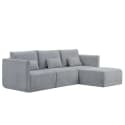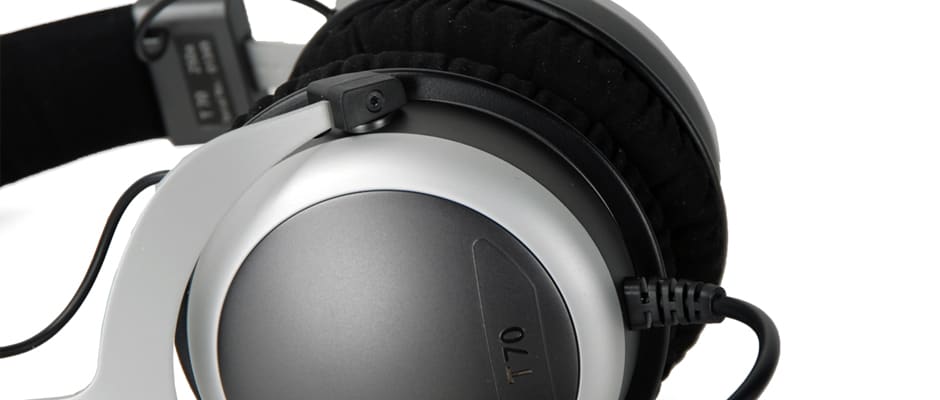Introduction
Comfort Design & Features
{{section_header}}{{section.name}}{{/section_header}}
As if often the case, these cushy, comfortable on-ears are the antithesis of portability.
For connectivity, these cans have a straight, 1/8th-inch plug that can be used as a 1/4th-inch plug with the included adapter, which screws onto the base. Additionally, though these headphones come with a carrying case, you shouldn't take that to mean that they're in any way portable. Quite the opposite, in fact. Though it is possible to venture away from the computer without breaking them, they're not meant to be used in tandem with a mobile media platform. Especially when you consider that they have a 9.6-foot long cord.
As far as maintenance goes, outside of being able to pull off the ear pads to clean the foam guarding the speaker element, there really is not a whole lot you can do to maintain these headphones. Should the cord break, the Beyerdynamic T 70s do not have detachable cable structures, so unless you’re very used to soldering electronics, you're out of luck.
When first putting on the Beyerdynamic T 70s, you’ll notice how gingerly they cradle your skull, and how evenly they distribute their weight on the sides of your head. They do a good job of accommodating various head sizes, so don't expect much pinching or general discomfort. After listening to the Beyerdynamic T 70s for a period of six hours or more, there were a couple complaints about heat buildup in the office, but only a few people had this trouble. On the whole, the Beyerdynamic T 70s hold up very well over time, and don’t slide around too much.
It's also very worth mentioning that you'll need a fairly strong amp to power these cans—they're not going to work with a laptop or an iPod, as they require more juice than those products provide.
{{photo_gallery "Aesthetics Image", "Speaker Image", "Side Image", "Back Image", "Band Image", "Cable Image", "Plug Image", "Cord Guards Image", "Additional Features 1 Image", "Additional Features 2 Image", "Additional Features 3 Image", "Additional Features 4 Image", "Additional Features 5 Image", "In the Box Image", "Durability Image", "HATS-Front Image", "HATS-Side Image"}}
Audio Quality
{{section_header}}{{section.name}}{{/section_header}}
The Tesla T 70s are average performers, but they don't match the value requested via their price.
Beyerdynamic makes quality headphones, and the Tesla line still carries that badge of honor. The T 70s' redesigned drivers resulted in a somewhat uneven frequency response, though, worse than we've seen from Beyerdynamic in the past. There are some bizarre areas of underemphasis, making high mids and trebles sounds very muffled, and very distracting. We’re not sure why this is the case, but it’s a flaw that these cans were not able to correct even after hours of use and many tests.
Their tracking and distortion results were about average, though, and they are surprisingly good isolators. When listening to music, isn’t it a pain to have to raise your volume level due to outside noise? Well, if you’re listening in the right environment, the Beyerdynamic T 70s will help you prevent this, as they block out quite a bit of mid- to high-range noise.
Conclusion
{{section_header}}{{section.name}}{{/section_header}}
The Beyerdynamic Tesla T 70s feature some interesting new technology, but it needs to develop a little more.
Earlier this year, Beyedynamic announced their line of Tesla headphones, which promised a new improvement on the dynamic driver design. By drastically increasing the magnetic strength of the drivers, Beyerdynamic has created drivers that require fewer voice coils to operate, theoretically creating a driver that can move quicker, making the sound more accurate. While it’s certainly possible that this is the case, we currently do not test for clarity, and thus we cannot tell you for certain with scientifically-collected data.
While the Beyerdynamic T 70 is certainly impressive in many respects, we find that it does have some troubles that Beyerdynamic headphones typically do not have. We realize that it may take a while for Beyerdynamic’s new technology to mature and become as polished as some of its older models of premium headphones, but it’s not quite there yet.
All that being said, if you’re an audiophile looking for something new that works very hard to preserve detail in sound, the Beyerdynamic T 70s, and the rest of the Tesla line, are certainly worth a listen. Like we said, there are some blemishes in performance that are a little mystifying, but nothing that should destroy your listening experience, especially if you are a fan of high levels of detail in your music. Just be ready to pay through the nose for the novelty of having a driver that generates a magnetic field of 1.2 Tesla.
Science Introduction
{{section_header}}{{section.name}}{{/section_header}}
The Beyerdynamic Tesla T 70s tested with fair performance results. Beyond external issues like comfort and usability, the science page is here to flesh out the details of our test results, specifically those concerned with the ins and outs of pure audio performance. If you've got questions about our test results, or simply don't know what to make of a particular frequency response quirk, you're in the right place.
Frequency Response
{{section_header}}{{section.name}}{{/section_header}}
While the T 70s didn't test with a terrible frequency response, we did find some quirks that may be related to Beyerdynamic's new speaker technology.
A frequency response test is meant to reveal any anomalies in the way a pair of headphones reproduces the frequency spectrum. In other words, if it over- or under-emphasizes bass, middle, or treble tones, our test will reveal it. Ideally, we want to see a flat, even line across the majority of the spectrum. While some degradation of the highest frequencies is to be expected, we hope for even emphasis from about 100Hz to about 10kHz.
The Tesla T 70s struggled in a few brief, but notable, frequency ranges. There is a rather bizarre area of underemphasis from 5.5 to 8kHz, which means high mid-tones (such as a higher alto or lower soprano singing voice) are going to be buried in the mix compared to other instruments.
{{photo_gallery "Science Section 1 Images"}}
Isolation
{{section_header}}{{section.name}}{{/section_header}}
These cans block out a decent amount of mid- to high-frequency noise.
Isolation refers how well (or how poorly) a pair of headphones blocks ambient noise. The Beyerdynamic Tesla T 70s do a good job of this. As the frequency (pitch) of ambient noise increases from low frequency to high frequency, the T 70s get gradually better at attenuating noise.
Very low frequency sounds around 100Hz, such as a freight truck horn, won't be naturally blocked by the T 70s, but higher pitched sounds—like that screaming kind on the subway—won't interrupt your listening experience. Isolation is important both to aesthetic quality of your audio and as a way to prevent noise-induced hearing loss. If you don't have to turn your music up to block out basic ambient noise, your headphones are good isolators.
{{photo_gallery "Science Section 2 Images"}}
Other Tests
{{section_header}}{{section.name}}{{/section_header}}
{{photo_gallery "Other Tests Images"}}
Meet the tester
A seasoned writer and professional photographer, Chris reviews cameras, headphones, smartphones, laptops, and lenses. Educated in Political Science and Linguistics, Chris can often be found building a robot army, snowboarding, or getting ink.
Checking our work.
Our team is here for one purpose: to help you buy the best stuff and love what you own. Our writers, editors, and lab technicians obsess over the products we cover to make sure you're confident and satisfied. Have a different opinion about something we recommend? Email us and we'll compare notes.
Shoot us an email


